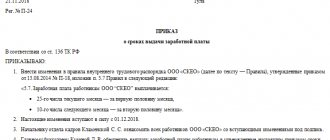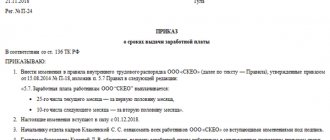Modern forms and types of remuneration
At the moment, there are two types of salaries that are issued to employees monthly:
- basic - it is accrued to employees for the period worked;
- additional - goes to the person’s account for the time that was not worked (this includes vacation pay and sick leave).
There are also two generally accepted forms of salary:
- time-based is a form of remuneration when funds are accrued to the employee for the time period worked;
- piecework - wages are paid for the quantity of products that were manufactured at the enterprise.
Payment in kind - what is it?
Payment in kind is the payment to subordinates of a part or full salary in kind in the form of products produced by the enterprise, employees or purchased by the company for the purpose of sale.
According to generally established requirements, salaries to subordinates in non-monetary form are given in the form of consumer goods. These often include food products.
More specific cases are often noted when temporary housing is transferred or provided for workers.
Non-monetary salary – when and how can it be paid?
06March
It happens that, for one reason or another, the question arises in an organization: is it possible to give part of the wages to employees not in money, but, for example, in the company’s products or lunches? And if so, how to arrange it all?
First of all, yes, you can pay part of your salary not in money. Article 131 of the Labor Code of the Russian Federation (hereinafter referred to as the Labor Code of the Russian Federation), along with the usual monetary form of wages, also provides for “other forms,” including non-monetary (in kind). Payment in kind can be, in particular, the provision of meals or products from the agricultural and food industries. However, in order to take advantage of this opportunity, several important points must be taken into account.
- The possibility of such payment should be provided for by a collective or employment contract or an additional agreement to the employment contract, but not by a local regulatory act of the employer, for example, a regulation on remuneration.
- Such payment must be made upon a written application from the employee for the payment of part of his wages in kind. The application can be written both for payment of wages for a specific month, and for a specific period (for example, a quarter, a year). But even then, the employee has the right to refuse this option at any time, in agreement with the employer.
- The share of payment in kind (including VAT) cannot exceed 20% of the total amount of salary accrued for the month, including personal income tax. The calculation does not take into account the amount of sick leave, travel allowance and other payments that are not wages.
- The form in which non-monetary payments are made must not contradict Russian legislation and international treaties of the Russian Federation.
- Goods issued as wages must be suitable for personal consumption of the employee or members of his family (food, clothing, household items) or bring him some benefit. It is prohibited to issue salaries in bonds, coupons, in the form of promissory notes, as well as alcoholic beverages, narcotic, poisonous, harmful and other toxic substances and other goods prohibited or restricted in free circulation.
- The cost at which goods are transferred as wages (including VAT) must be reasonable, fair and not exceeding their local market value in the current payment period.
Thus, it turns out that the key points here will be the employee’s consent to such payments, the limitation on the share of payments in kind, as well as compliance with the law in relation to a number of goods with limited turnover. If you end up in court proceedings with an employee over the fact that you provided part of the payment in kind, then keep in mind that the court will also take into account how common or desirable such payment is for the given industry. type of economic activity or profession (subparagraph b, paragraph 54 of the Resolution of the Plenum of the Supreme Court of the Russian Federation dated March 17, 2004 No. 2 “On the application by the courts of the Russian Federation of the Labor Code of the Russian Federation”). For example, partial payment of wages in kind can be recognized as usual and desirable at catering, culinary, etc. enterprises. And in relation to members of production and agricultural cooperatives, this possibility is enshrined in Part 7 of Art. 40 of the Federal Law of December 8, 1995 No. 193-FZ “On Agricultural Cooperation”, Part 1 of Art. 19 of the Federal Law of 05/08/1996 No. 41-FZ “On Production Cooperatives”. Most often, the situation with payment of part of the salary “in kind” is used as a forced measure in a crisis or unstable financial situation, as well as when a company wants to reduce income tax by providing employees with food or when applying a simplified taxation system. By the way, it is best to formalize such forms of payment to employees as part of the salary, and not as social benefits. The fact is that it is the replacement of part of the salary with a natural product, including food, that allows, when calculating income tax within the framework of the general taxation system (GTS), as well as for the purpose of paying tax under the simplified taxation system (STS), to take into account the cost of lunches in expenses , but only within 20% of the accrued monthly salary (clauses 1, 4, 25, part 2, article 255, clause 25, article 270, subclause 6, clause 1, article 346.16 of the Tax Code of the Russian Federation, hereinafter referred to as the Tax Code RF). If the provision of lunches is provided as an additional condition of the employment contract, that is, not as remuneration, but as compensation for the cost of food as part of a social package, the organization will not be able to take such expenses into account for profit tax purposes and taxes when applying the simplified tax system. Salaries in kind are subject to personal income tax in the generally established manner on the market value of products, generally at a rate of 13%, and are also subject to insurance contributions in the generally established manner, since such payment is made within the framework of an employment relationship. In addition, the employer must remember that the operation of transferring goods (work, services) to employees as remuneration in kind is recognized as a sale, and their value is included in the VAT taxable base (subclause 1, clause 1, article 146, clause 2, Article 154 of the Tax Code of the Russian Federation) It turns out that there is no legal ban on paying part of wages in natural products. Moreover, this format may be beneficial to the organization, but it must be taken into account that the final word here will remain with the employee.
How to process salary payment?
To calculate wages, the accountant must use the T-51 or T-49 statement. To issue funds, he must draw up a separate statement.
It should be noted that the T-53 statement is not intended for calculating wages in non-monetary form. That is why it is impossible to use it for this type of payment.
To simplify the task, you should use the statement form that was developed for agricultural complexes No. 415-APK. First, it should be noted that in order to use it, this must be specified in the accounting policy of the organization (this is relevant if the company is engaged in other types of activities other than agricultural ones).
Payment requirements
Issues of payments in kind are regulated by Article 131 of the Labor Code of the Russian Federation. In accordance with it, a number of requirements are established that the employer must fulfill if he decides to use this method of repaying wage debts at his enterprise. These include:
- This method of paying workers must be enshrined in internal regulations.
- Employees must agree with management's proposal.
- The share of wages paid to an employee in non-monetary form cannot exceed 20% of accrued earnings.
- If there are quality complaints about the product, or it turns out to be unnecessary for the employee, he should have the opportunity to replace or refuse it.
The employee determines independently the part of the salary that he will receive in goods. It may be a different percentage in different months. There may be months when he will only agree to give out money. If something in goods or services does not suit an employee, he can refuse to receive them at any time or demand a replacement.
Payment amount
There is one important point that should always be taken into account. The enterprise has the right to pay only part of the salary in kind. The share should not be more than twenty percent of the total accrued amount.
There are often situations when an employee of an organization personally asks management to give him a large part of his salary in kind. He insists that it be more than twenty percent.
If such a situation arises, it is necessary to pre-register the sale of the property. In other words, according to the documents, everything should look as if the employee received the full amount of the salary, and then purchased property in the company where he works for cash.
If the payment amount exceeds the twenty percent limit, this can lead to problems. For example, the inspection authorities may ask why the employee received a share of the salary in kind that exceeds the established limit.
Can wages be paid in kind?
The current Labor Legislation of the Russian Federation does not infringe upon the employer’s right to pay wages in kind to employees of the enterprise. This rule is regulated by Article 131 of the Labor Code of the Russian Federation.
It should be noted that non-monetary forms may only account for a certain portion of wages.
The size of this share should be no more than 20% of the total amount calculated for payment.
From this we can conclude that at least 80% of the salary must be paid in cash (through a cash register or to a bank card), the rest can be paid in kind.
Violation of this rule is considered a violation of the Law.
If necessary, the employer may be held liable for unlawful acts.
Making adjustments to the established rules for paying wages is unacceptable even with the consent of all parties.
If an enterprise pays part of its wages in non-monetary form, the procedure and technology for its payment must be reflected in the collective agreement or other internal documentation.
The papers must describe the exact rules by which remuneration is carried out in the previously specified manner.
No less important is the fact that a non-monetary form of remuneration can only be used if an employed citizen has submitted a corresponding application. It can be issued for 1 month or for a certain period of time.
Pay in kind can be expressed as follows:
- products manufactured at the enterprise where the employee works;
- goods that were purchased for the purpose of sale;
- free food, groceries;
- payment for housing;
- insurance.
In addition, there are some restrictions. Salaries cannot be paid in:
- bonach;
- coupons;
- weapons;
- ammunition;
- debt obligations;
- alcoholic products;
- poisonous, narcotic and explosive substances;
- receipts.
The issuance of such goods will be considered a violation of the law even if both parties to the employment relationship have consented to this action.
Accounting
Depending on what kind of property the company is going to give to the employee in the form of wages, further accounting operations depend.
When issuing funds in finished products or goods, the following entries should be made:
- Debit 70 Credit 90-1 . Revenue from the transfer of finished products (goods) to pay salaries is reflected;
- Debit 90-2 Credit 43 (41) . The cost of goods is written off and transferred to the subordinate as salary.
The transfer of other property (materials, fixed assets) on account of wages must be reflected in accounting as follows:
- Debit 70 Credit 91-1. Revenue from the transfer of any property to pay the wages of an employee of the enterprise is reflected;
- Debit 91-2 Credit 01 (08, 10, 21...) . The total value of the property is written off and transferred to the subordinate as salary;
- Debit 02 Credit 01 . Depreciation on retired property is written off (when transferring fixed assets).
https://youtu.be/9-VnF4wyDHg
Payout example
Let's look at a specific example of how the share of salary in kind is calculated. Open Joint Stock Company "North Pole" gave the company's employee D.I. Alekseev a share of the salary for December 2020 in kind. The condition for such payment was previously stated in the employment contract with Dmitry Alekseev.
The employee’s salary for December was accrued in the amount of 35,000 rubles.
Alekseev wrote a statement according to which he was given a bread machine worth 3,000 rubles as part of his salary. The tax in this case was 458 rubles. The price of the household appliance at which the company purchased it was 1,500 rubles. VAT amounted to 229 rubles. Accordingly, the amount of goods does not exceed twenty percent of the salary. The wiring will look like this:
- D44 K70 - the employee was accrued a salary in the amount of 35,000;
- D70 K68 - tax in the amount of 4550 was withheld from it;
- D44 K69 - additional insurance premiums were charged in the amount of 7,700;
- D70 K90 subaccount “Revenue” - Alekseev was given goods as wages in the amount of 3,000 rubles;
- D90 subaccount “VAT” K68 - tax charged in the amount of 458 rubles;
- D90 subaccount “Cost of sales” K41 - the bread machine was written off at cost, the amount of which is 1,271 rubles (1,500 - 229);
- D70 K50 - the citizen received the balance of his salary in the amount of 27,450 rubles (35,000 - 4550 - 3000).
When calculating income tax, income must include the proceeds received from the sale of a bread machine of 2542 rubles (3000 - 458), expenses include the cost of goods 1271 rubles (1500 - 229).
Documenting
First of all, the issue of replacing cash payments with in-kind ones is adopted in the collective agreement and is included in the regulations on wages. The procedure for issuing it should also be specified there. It is mandatory to indicate the form of salary payment in the employment contract, which is drawn up upon hiring an employee. If such a clause is missing in already accepted documents, it can be added by making additions and changes. At the same time, it is necessary to control that the internal documents of the enterprise do not contradict labor legislation. So, for example, if the share of payment in kind is not allowed for more than a fifth of the salary, more percentages cannot be reflected in the collective agreement.
The collective agreement is adopted with mutual consent of the management of the enterprise and the workforce. But, despite this, each employee must have a written statement agreeing to receive part of the salary in kind. It can be issued alone for a long period or only for one month. In the application, the employee can indicate what type of product he would like to receive and what amount of cash payments it can replace. The cost of such products should be recorded in a separate document, which the employee would have the opportunity to review before writing the application. This may be a directive, an order or an annex to a collective agreement. The enterprise administration needs to control that the price of products issued to employees is in an amount not exceeding the market level in the region. Otherwise, the requirement of reasonableness and fairness, which is mandatory for non-monetary payments, will be violated.







